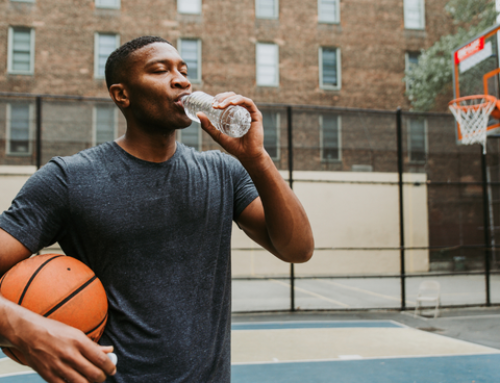Weight Loss and Other Benefits of Staying Hydrated
When athletes set up a weight loss program, they typically take diet and exercise into consideration but neglect the important element of hydration. (See Elements of Proper Hydration.) Regardless of your personal goals, continually supplying your body with fluids is critical. Staying hydrated speeds results and turns you into a leaner and tougher athlete. Here’s why you should never overlook your hydration levels.
Increases Metabolic Rate
When you’re well hydrated, your metabolism runs at top speed[1], so you burn calories faster than normal. Even a slight degree of dehydration influences how fast you burn body fat throughout the day. Just be sure that what you choose to drink is low in calories and sugar. Good choices are water, herbal tea and green tea, consumed as often as possible.
Improves Energy Levels
If your endurance has declined or you feel yourself getting weak or dizzy, you’re probably dehydrated. When this happens, any form of exercise feels much more difficult. Staying hydrated enhances energy levels and keeps your blood pressure up, which helps your energy level stay constant. Those who suffer from low blood pressure often feel fatigued as a result.
Reduces Hunger
Next time you feel hungry, try this trick. Before you reach for a snack, drink a glass of water, wait ten minute and see if your hunger passes. Often, people eat something when they’re really thirsty, because they mistake thirst for hunger. Staying hydrated reduces hunger pangs, making it easier to either lose weight or maintain your current weight.
Enhances Exercise Performance
Getting enough water to muscle tissue reduces the chance of cramping and ensures your ability to generate force. If you’re suffering from dehydration, you won’t be able to lift as much weight as you normally would. Drinking water as you move through a strength workout is one of the best ways to perform your best [2].
References
[1] U. Keller, G. Szinnai, S. Bilz, K. Berneis, “Effects of changes in hydration on protein, glucose and lipid metabolism in man: impact on health.” European Journal of Clinical Nutrition, vol. 57 Suppl 2, no. S2, pp. S69-74, Dec. 2003. [2] G. C. Gauchard, P. Gangloff, A. Vouriot, J.P. Mallie, P. P. Perrin, “Effects of exercise-induced fatigue without hydration on static postural control in adult human subjects,” International Journal of Neuroscience, vol. 112, no. 10, pp. 1191-1206, Jan. 2002.RECOMMENDED FOR YOU
MOST POPULAR
Weight Loss and Other Benefits of Staying Hydrated
When athletes set up a weight loss program, they typically take diet and exercise into consideration but neglect the important element of hydration. (See Elements of Proper Hydration.) Regardless of your personal goals, continually supplying your body with fluids is critical. Staying hydrated speeds results and turns you into a leaner and tougher athlete. Here’s why you should never overlook your hydration levels.
Increases Metabolic Rate
When you’re well hydrated, your metabolism runs at top speed[1], so you burn calories faster than normal. Even a slight degree of dehydration influences how fast you burn body fat throughout the day. Just be sure that what you choose to drink is low in calories and sugar. Good choices are water, herbal tea and green tea, consumed as often as possible.
Improves Energy Levels
If your endurance has declined or you feel yourself getting weak or dizzy, you’re probably dehydrated. When this happens, any form of exercise feels much more difficult. Staying hydrated enhances energy levels and keeps your blood pressure up, which helps your energy level stay constant. Those who suffer from low blood pressure often feel fatigued as a result.
Reduces Hunger
Next time you feel hungry, try this trick. Before you reach for a snack, drink a glass of water, wait ten minute and see if your hunger passes. Often, people eat something when they’re really thirsty, because they mistake thirst for hunger. Staying hydrated reduces hunger pangs, making it easier to either lose weight or maintain your current weight.
Enhances Exercise Performance
Getting enough water to muscle tissue reduces the chance of cramping and ensures your ability to generate force. If you’re suffering from dehydration, you won’t be able to lift as much weight as you normally would. Drinking water as you move through a strength workout is one of the best ways to perform your best [2].
References
[1] U. Keller, G. Szinnai, S. Bilz, K. Berneis, “Effects of changes in hydration on protein, glucose and lipid metabolism in man: impact on health.” European Journal of Clinical Nutrition, vol. 57 Suppl 2, no. S2, pp. S69-74, Dec. 2003. [2] G. C. Gauchard, P. Gangloff, A. Vouriot, J.P. Mallie, P. P. Perrin, “Effects of exercise-induced fatigue without hydration on static postural control in adult human subjects,” International Journal of Neuroscience, vol. 112, no. 10, pp. 1191-1206, Jan. 2002.











